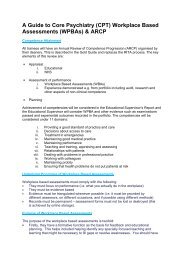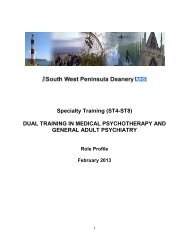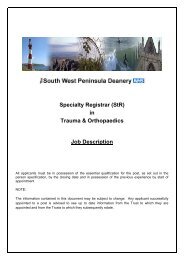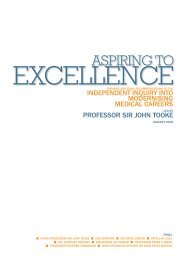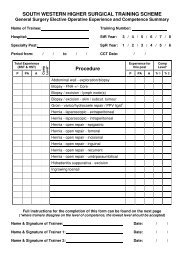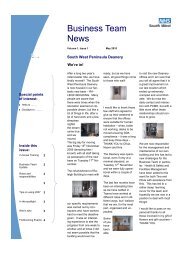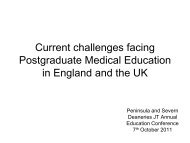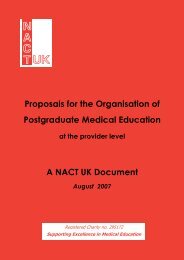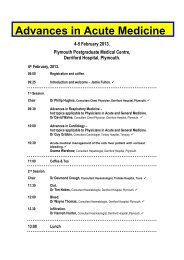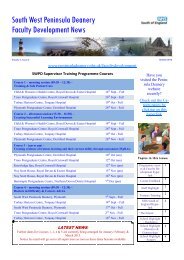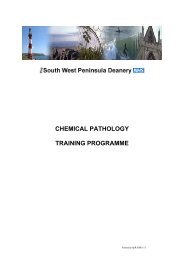Job Description - South West Peninsula Deanery
Job Description - South West Peninsula Deanery
Job Description - South West Peninsula Deanery
Create successful ePaper yourself
Turn your PDF publications into a flip-book with our unique Google optimized e-Paper software.
ACADEMIC CLINICAL FELLOW<br />
Public Health<br />
<strong>Job</strong> <strong>Description</strong><br />
2013<br />
1
<strong>Job</strong> <strong>Description</strong><br />
<strong>Peninsula</strong> Medical School<br />
ACADEMIC CLINICAL FELLOWSHIP IN PUBLIC HEALTH<br />
This three-year post is part of a broad programme to improve academic medical career<br />
pathways and is co-ordinated by the NIHR Trainees Coordinating Centre (NIHR TCC), see<br />
www.nihrtcc.nhs.uk. It is part of the <strong>South</strong> <strong>West</strong> Region’s Public Health Specialty training<br />
scheme and will provide a grounding in service Public Health and an introduction to academic<br />
Public Health. The post is open to all doctors who can meet the entry requirements as<br />
specified in the person specifications.<br />
The Fellow will spend the first year of training obtaining a Masters (or equivalent) in Public<br />
Health (MSc / MPH) and will be expected to pass Part A of the Faculty of Public Health<br />
membership exams by the end of this year. By the end of the second year of training they will<br />
submit an application for a research training fellowship leading to a higher degree (PhD/MD).<br />
By the end of Year Three they will be expected to have passed Part B of the Faculty of Public<br />
Health membership exams.<br />
The academic base will be in the <strong>Peninsula</strong> Medical School (Universities of Exeter and<br />
Plymouth) with an attachment to one of the PMS research sites and groups listed below.<br />
However, there are currently changes occurring within the <strong>Peninsula</strong> Medical School which<br />
will be confirmed with the appointed candidate upon commencement. The service base will<br />
be within a Public Health department located in a local authority setting within the <strong>Peninsula</strong><br />
<strong>Deanery</strong> boundary. The post is split 25:75 between PMS and the local Public Health service<br />
base.<br />
The Postgraduate Dean has confirmed that this placement and/or programme has the<br />
required educational and dean's approval.<br />
The <strong>Peninsula</strong> College of Medicine and Dentistry<br />
<strong>Peninsula</strong> College of Medicine & Dentistry (PCMD) is based in the Universities of Exeter<br />
(UofE) and Plymouth (UofP) and has research sites mainly in Exeter, Plymouth and Truro.<br />
Investment in public health research has been exceptional, and critical mass is enhanced by<br />
collaboration with internationally excellent researchers in psychology, sports and health<br />
sciences, nursing and maths and statistics at the parent universities. <strong>Peninsula</strong> has been<br />
chosen to be one of eight universities nationally contributing to the NIHR National School for<br />
Public Health Research.<br />
2
PCMD has strengths in four key public health research areas:<br />
(1) Epidemiology and Public health needs assessment (lead Prof. David Melzer). Professors<br />
Melzer (PCMD) plus Hennessy and Asthani (U of P) all use clinical or epidemiological data to<br />
identify risk factors, measure needs, evaluate the impact of interventions ‘in the real world’,<br />
and inform policy. Recent successes include reporting on 32 RAND treatment quality<br />
measures in England (BMJ, 2008). An NIHR/MRC methodology project (£355K) will develop<br />
the Prior Event Rate Ratio (PERR) method for estimating intervention effects in observational<br />
data.<br />
(2) Developing and evaluating health behaviour change interventions (Lead Prof Charles<br />
Abraham). <strong>Peninsula</strong> hosts a large interdisciplinary group pursuing research into behaviour<br />
change intervention design and evaluation. Effective interventions developed by the group<br />
have increased weight loss in Weight Watchers programmes, increased physical activity<br />
through engagement with the local environment, increased cognitive functioning among<br />
elderly people in residential homes through enhanced social interaction, and used physical<br />
activity to promote smoking cessation and reduce depression.<br />
(3) Health promotion and protection in the natural and work environment (Lead Prof Lora<br />
Fleming). We have established the European Centre for Environment and Human Health, in<br />
Truro, Cornwall, with EU support of £12m. The centre has assembled a formidable team of<br />
toxicologists, epidemiologists, economists, microbiologists, geographers and ecologists<br />
researching ways to promote health in the occupational and natural environment, and<br />
protecting health from environmental hazards. Early successes include Healthy Workplace<br />
Cornwall, an intersectoral program led by Dame Carol Black to increase the health and<br />
wellbeing of workers and their families through increased interactions with the natural<br />
environment.<br />
(4) Synthesising Public Health Evidence (Lead Prof Ken Stein). <strong>Peninsula</strong> Technology<br />
Assessment Group (PenTAG, >£7.5m funding from NIHR, NICE, DoH) is part of the NICE<br />
Technology Appraisal system and is one of only two academic Collaborating Centres<br />
supporting NICE's Public Health Guidance function. PenTAG provides particular expertise in<br />
qualitative research synthesis, usually to identify barriers and facilitators of the<br />
implementation of public health interventions. Recent successes include reviews of the harms<br />
of ecstacy (for the Home Office and Advisory Committee on the Misuse of Drugs); screening<br />
for hepatitis C in intravenous drug users (HTA Programme); weight management schemes for<br />
the under 5’s (HTA Programme); and screening tests for child physical abuse in A&E<br />
departments.<br />
3
There are also opportunities to work with academics in developing areas of research within<br />
the Medical School such as implementation science, realist evaluation, and health-service<br />
public health, and enquiries about work in these areas are welcome.<br />
Service Public Health training<br />
The service base will be within a Public Health department located in a local authority setting<br />
within the <strong>Peninsula</strong> <strong>Deanery</strong> boundary. The service base will be confirmed upon<br />
appointment.<br />
Exeter is the site of the newly created Health Protection Agency’s SW (<strong>South</strong>) Acute<br />
Response Centre, the hub and co-ordination point for health protection activity across Devon,<br />
Cornwall, Dorset and Somerset. As part of his or her training, the fellow will spend a threemonth<br />
attachment with the Health Protection Agency where his or her training will cover<br />
control of communicable diseases and environmental hazards.<br />
Teaching<br />
Public Health contributes to teaching on the undergraduate degree for medical students,<br />
including modules on evidence based medicine. There are also opportunities to contribute to<br />
the post-graduate programmes. All new lecturing staff joining the University can attend a parttime<br />
Teaching and Learning Programme. This provides, on a modular basis, a practical<br />
introduction to teaching in Higher Education. The successful applicant would be expected to<br />
actively participate in the school’s undergraduate medical student teaching programme and<br />
post-graduate programme.<br />
The training programme<br />
The post will be supported by established supervisors (one educational, one academic) who<br />
will regularly review training needs based on the Faculty of Public Health’s assessment<br />
guidelines. On the basis of joint review with the fellow, a suitable training programme will be<br />
agreed and regularly updated, to ensure satisfactory progress towards obtaining the<br />
Certificate of Completion of Training in Public Health. All Fellows will be part of the region’s<br />
existing programme of Annual Review of Competency Progression (ARCP) reviews.<br />
Academic time will be protected and will be based in a different location from NHS service<br />
work. There will be more academic sessions in the earlier part of training as the trainee<br />
prepares their research training fellowship application. A Public Health tutorial programme is<br />
co-ordinated for all trainees within the region. A programme of update sessions on<br />
communicable disease/environmental health topics is led by the Health Protection Agency.<br />
Within the local Public Health Network there are CPD/Governance/Audit meetings and<br />
4
attendance records are kept. All staff are part of an annual process of Individual Performance<br />
and Development Review.<br />
Academic clinical fellowships in public health will have direct access to PCMD’s NIHR<br />
approved research training programme that is available to all ACFs in the <strong>Peninsula</strong> region.<br />
Typical examples of research training opportunities can be viewed on PCMD’s website via<br />
this link http://www.pcmd.ac.uk/postgraduate.php?tab=research_training<br />
Milestones<br />
Year One The fellow will take a Masters in Public Health (MPH) and additional training in<br />
preparation for the Part A membership of the Faculty of Public Health. They can attend the<br />
five-day pre-Part A course organised by the University of Bristol School of Social and<br />
Community Medicine. The fellow will keep in regular contact with their trainers, meeting them<br />
two to three times per term. They will sit MFPH Part A towards the end of the year.<br />
Year Two: Three to three-and-a-half days per week NHS service work (based in the PCT) and<br />
the remaining time in the academic centre developing research ideas / papers and engaging<br />
in a small amount of teaching. As research fellowship applications will need to be submitted in<br />
the early part of Year Three, a greater amount of academic contact will occur in year Two<br />
compared to year Three. Cross cover arrangements will not be required to cover public health<br />
on-call commitments. Fellows will have monthly three-way meetings with both supervisors to<br />
co-ordinate and review the training programme. The fellow will have more frequent (every one<br />
to two weeks) dedicated one-hour meetings with their educational supervisor and academic<br />
supervisor.<br />
Year Three By the third year of the fellowship the fellow will be expected to have submitted for<br />
publication in peer-reviewed journals two to three papers and to have presented at one or two<br />
national Public Health conferences. Final preparation of the research fellowship application<br />
will be led by the candidate with support from their academic trainer, the fellowship<br />
supervisor(s) and appropriate research staff in <strong>Peninsula</strong> (statisticians / economists /<br />
qualitative researchers as required). Contact with the academics will decrease to a regular<br />
single day per week after the research fellowship applications have been submitted. Regular<br />
meetings with the educational supervisor and academic supervisor will continue throughout<br />
the year.<br />
At the end of the three-year post, post-holders who are successful in obtaining a doctoral<br />
fellowship award will apply to the Faculty of Public Health and the <strong>Deanery</strong> for time ‘out of<br />
programme’ to complete their PhD. During the ‘out of programme’ time, it is expected that the<br />
post-holder will become an employee of the relevant University.<br />
Programme Management and Administration<br />
5
The post-holder will join the <strong>South</strong> <strong>West</strong> Public Health Specialty training scheme: Programme<br />
Director Dr. Chris Hine. The scheme has regular “training the trainer” events for new and<br />
existing educational and academic supervisors. Trainees have monthly study days. Trainees<br />
undergo regular appraisal with their supervisors (see above) and have an annual review of<br />
training through an ARCP by internal and external panel members. Progress to the next year<br />
of training is dependent on the outcome of this review. If there are concerns about aspects of<br />
training the fellow will be reviewed earlier. Fellows wishing to return to mainstream NHS<br />
training will have alternative recognised training locations identified in the locality. The training<br />
programme in the region is overseen by a Regional Training Committee, which includes an<br />
academic representative and meets four times per year. The training departments, including<br />
the academic centre, are part of the Faculty of Public Health (FPH) quality assurance<br />
programme of annual visits by external representatives of the FPH. Public Health trainees in<br />
the <strong>South</strong> <strong>West</strong> have a well-developed buddy system where a more experienced trainee on<br />
the regional training programme is paired with the new trainee.<br />
In the academic department the fellow will be provided with office accommodation, a<br />
computer and software, filing space, adequate privacy, proximity to key members of staff, a<br />
telephone and access to suitable accommodation to conduct interviews and meetings.<br />
Training subsequent to completion of fellowship<br />
To obtain a CCT in Public Health the post-holder will need to complete up to 2 years further<br />
training after completion of the fellowship, so that CCT requirements are met. Post-holders<br />
will be able to obtain this further training either by successfully competing for one of the<br />
Lecturer posts in the <strong>Peninsula</strong> College of Medicine and Dentistry, or other academic<br />
institutions in the UK or by returning to an NHS service public health post in the <strong>South</strong> <strong>West</strong><br />
region (or in another region by inter-deanery transfer). This latter route back into NHS training<br />
will be available as a matter of course assuming they have previously made satisfactory<br />
progress as judged by ARCP assessments.<br />
Induction Programme<br />
During the first four weeks, the post-holder will be given the opportunity to meet all members<br />
of staff in both the academic and service departments and attend important meetings. A brief<br />
resume of the post-holder’s past experience will be made available to members of both<br />
Departments in order to facilitate their incorporation within the organisations. Initially daily<br />
contact with either the Educational or Academic Supervisor will take place.<br />
On-call Duties and Supervision<br />
After appropriate training in Health Protection, the post-holder will participate in the local oncall<br />
for the Health Protection Agency. This commitment will be no more than on a one in eight<br />
basis and will always be supervised by a member of Consultant staff. They will not be placed<br />
6
on the on-call rota until they have completed their three months health protection training<br />
(unless this has already been undertaken in another region)and passed the on-call<br />
assessment plus a local induction programme.<br />
If the post-holder is successful in obtaining a doctoral fellowship award and have an ‘Out of<br />
Programme’ period agreed by the <strong>Deanery</strong> continuing on the on-call rota is not guaranteed.<br />
Office Accommodation<br />
The post-holder will be provided with adequate office accommodation. As a minimum this will<br />
include provision of own desk, adequate filing space, adequate quiet and privacy where<br />
necessary, proximity to key members of staff, reasonable access to a telephone and access<br />
to suitable accommodation to conduct interviews and meetings.<br />
Statistical, Computing and Clerical Support<br />
The post-holder will have access to expert statistical advice when necessary, will receive<br />
basic training in computer skills, will have access to a computer for word processing,<br />
spreadsheet, graphics and statistical packages. They will have full access to the<br />
Postgraduate Short Course Programme.<br />
Study Leave Entitlement<br />
The post-holder will be entitled to leave with pay and expenses for the purposes of approved<br />
courses and conferences as specified in the <strong>South</strong> <strong>West</strong> Public Health Specialty Training<br />
Programme Policy.<br />
Travel and Subsistence Allowance<br />
This will be provided in accordance with the <strong>South</strong> <strong>West</strong> Public Health Specialty Training<br />
Programme Policy.<br />
Salary<br />
Salaries will be on the Specialty Registrar scale.<br />
Additional Information: For additional information contact Dr. Iain Lang (Senior<br />
Lecturer in Public Health, <strong>Peninsula</strong> Medical School and Consultant in Public Health, NHS<br />
Devon: tel. 07970 799249 or email iain.lang@pms.ac.uk).<br />
Information about the <strong>South</strong> <strong>West</strong> Public Health Training Programme can be found at:<br />
http://www.swph-education.org.uk/<br />
7
Details of PCMD NIHR approved research training programme opportunities can be viewed<br />
on PCMD’s website: http://www.pcmd.ac.uk/postgraduate.php?tab=research_training<br />
8



